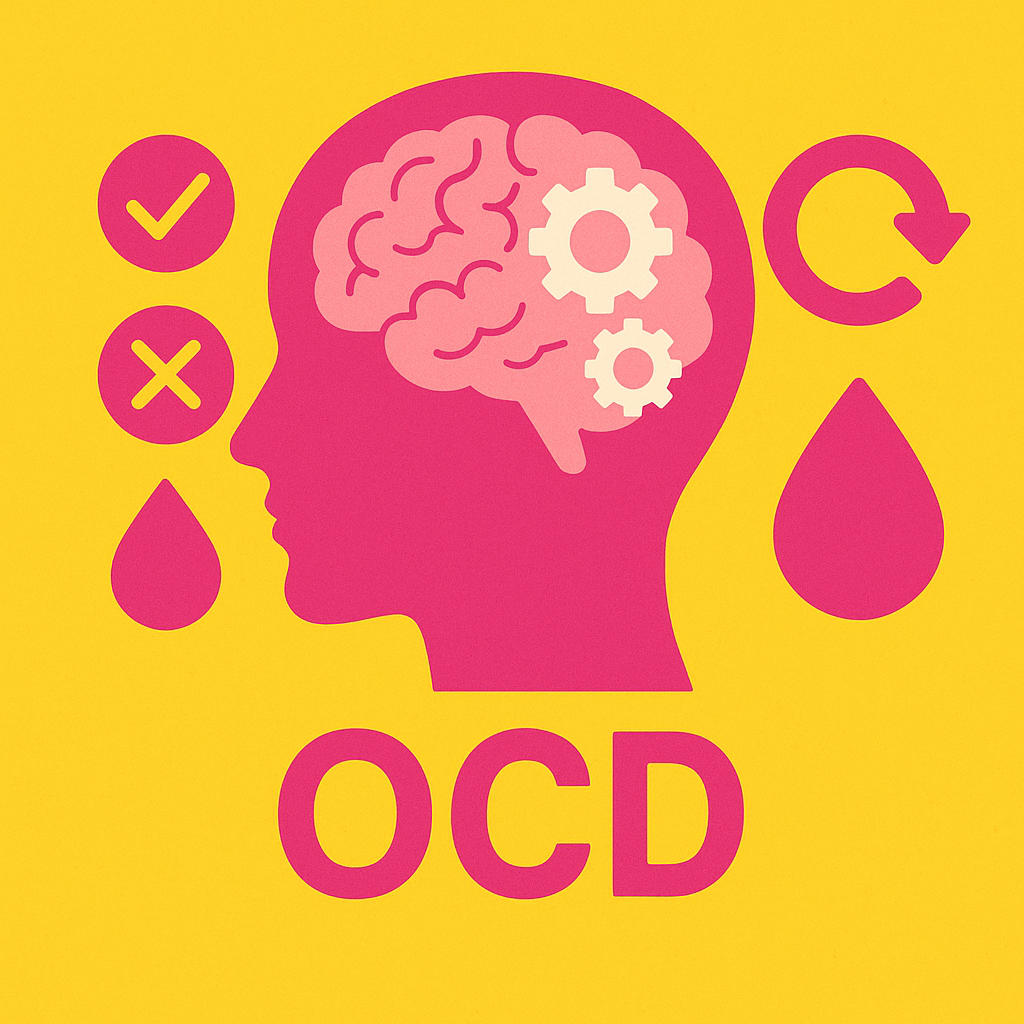Obsessive-Compulsive Disorder (OCD)
Obsessive–Compulsive Disorder (OCD): A Whole-Person Guide
CareSync Psych Blog
For More Info Visit CareSync Psych at www.caresyncpsych.com
Obsessive–Compulsive Disorder (OCD) is not a personality quirk or a preference for neatness—it’s a neuropsychiatric condition marked by intrusive, distressing thoughts (obsessions) and repetitive behaviors or mental acts (compulsions) performed to reduce anxiety. Untreated, OCD can consume hours each day; treated, it is highly manageable with the right combination of therapy and, when appropriate, medication (Curtiss et al., 2021; Singh et al., 2023).
What OCD Is—In Plain Language
-
Obsessions: Unwanted thoughts, images, or urges (e.g., “What if I harmed someone?” “What if this is contaminated?”).
-
Compulsions: Behaviors or mental rituals done to feel safer or “just right” (washing, checking, praying, counting, neutralizing thoughts). Relief is temporary, which keeps the cycle going.
The Three Lenses: Biology, Psychology, and Environment
1) Biology (Brain & Body)
-
Circuits: In OCD, fronto-striatal-thalamic networks (e.g., orbitofrontal cortex, anterior cingulate, caudate) show dysregulated error-detection and habit loops, which can over-signal that “something is wrong” (Jalal, Chamberlain, & Sahakian, 2023).
-
Neurochemistry: Serotonergic systems (and often glutamatergic/dopaminergic modulation) are implicated—why SSRIs and clomipramine can help reduce symptom severity (Singh et al., 2023).
2) Psychology (How the Mind Interprets)
-
Cognitive style: Inflated responsibility (“If I don’t check, something bad will happen”), intolerance of uncertainty, perfectionism, and thought-action fusion (“Thinking it is as bad as doing it”) maintain obsessions and drive rituals (Curtiss et al., 2021).
-
Behavioral loops: Compulsions and safety behaviors reduce distress short-term, unintentionally “teaching” the brain that obsessions are dangerous—so they rebound stronger.
3) Environment (Context Matters)
-
Stress & learning: Stressful events, family accommodation (others assisting rituals), and critical/high-expressed-emotion environments can worsen symptoms (Singh et al., 2023).
-
Comorbidity: Anxiety disorders, depression, and tic-related conditions are common and can shape presentation and treatment planning (Singh et al., 2023).
How OCD Manifests (It’s Not Just Cleaning)
Common Symptom Dimensions
-
Contamination/Illness → washing, sanitizing, testing, reassurance seeking
-
Harm/Responsibility → checking stoves/locks, mental review of past actions
-
Symmetry/“Just-Right” → arranging, repeating until the feeling clicks
-
Forbidden/Taboo Thoughts (sexual, violent, blasphemous) → covert neutralizing, avoidance of triggers
-
Hoarding/Saving → difficulty discarding due to feared loss/consequence
Hidden Compulsions (Easy to Miss)
Compulsions aren’t always visible. Many are covert or cognitive, including:
-
Mental rituals: Replaying, counting, praying, “canceling” bad thoughts
-
Reassurance seeking: “Are you sure I didn’t offend them?”—by text, Google, or loved ones
-
Avoidance & safety behaviors: Not touching doorknobs, avoiding news, steering clear of people/places that trigger obsessions.
-
Importantly, avoidance in OCD functions as a compulsion—a ritual to reduce distress. While avoidance is also common in PTSD, in OCD it’s part of the obsession-compulsion feedback loop rather than a trauma cue response; clinically, it’s targeted like any other ritual in treatment (Curtiss et al., 2021).
-
Book an Appointment
Diagnosis At-a-Glance
-
Core features: Time-consuming obsessions/compulsions, significant distress, functional impairment.
-
Rule-outs: Differentiate from generalized anxiety, psychotic disorders, autism/ADHD-related rigidity, and trauma-related conditions (Singh et al., 2023).
-
Specifiers: Insight level (good/fair, poor, absent), tic-related.
What Actually Helps: Evidence-Based Care
1) CBT with Exposure and Response Prevention (ERP) — First-Line
-
How it works: Gradual, therapist-guided exposures to feared triggers without performing rituals. Over time, the brain relearns safety; anxiety peaks and then naturally falls.
-
Targets visible and hidden rituals: ERP addresses mental compulsions and avoidance directly (response prevention).
-
Skills add-ons: Cognitive restructuring, uncertainty tolerance, mindfulness, and relapse-prevention plans (Curtiss et al., 2021).
2) Medication — Often Alongside ERP
-
SSRIs (e.g., fluoxetine, sertraline, fluvoxamine, paroxetine, escitalopram) and clomipramine have the strongest evidence; OCD often requires higher doses and longer trials than depression/anxiety (Singh et al., 2023).
-
Augmentation: For partial responders, options may include low-dose antipsychotic augmentation or glutamatergic strategies under specialist care (Singh et al., 2023).
-
Why combine? Medication can lower baseline anxiety and obsessional intensity, making ERP more doable and durable (Curtiss et al., 2021).
3) Whole-Person Supports (CareSync Psych Approach)
-
Family work: Reduce accommodation and coach supportive responses.
-
Lifestyle & metabolic health: Sleep, exercise, nutrition, and stress-regulation improve cognitive control and therapy engagement.
-
Digital/at-home ERP tools: Between-session tracking, trigger hierarchies, and structured practice sustain momentum.
Book an appointment
Prognosis: OCD Is Treatable
With ERP/CBT, appropriate medication, and consistent practice, most people experience substantial reduction in symptoms and reclaim time, energy, and freedom. Setbacks happen; with relapse-prevention skills and a collaborative plan, progress is maintainable (Curtiss et al., 2021; Singh et al., 2023).
Key Takeaways
-
OCD is a brain-based, behavior-maintained condition shaped by biology, psychology, and environment.
-
Compulsions can be invisible (mental rituals, reassurance seeking) and avoidance acts like a ritual in OCD.
-
ERP/CBT and SSRIs/clomipramine are gold-standard treatments; many benefit from both.
-
With skilled care and practice, OCD is highly manageable—recovery is realistic.
References
-
Curtiss, J. E., Levine, D. S., Ander, I., & Baker, A. W. (2021). Cognitive-behavioral treatments for anxiety and stress-related disorders. Focus, 19(2), 184–189.
-
Jalal, B., Chamberlain, S. R., & Sahakian, B. J. (2023). Obsessive-compulsive disorder: Etiology, neuropathology, and cognitive dysfunction. Brain and Behavior, 13(6), e3000.
-
Singh, A., Anjankar, V. P., & Sapkale, B. (2023). Obsessive-compulsive disorder (OCD): A comprehensive review of diagnosis, comorbidities, and treatment approaches. Cureus, 15(11).
